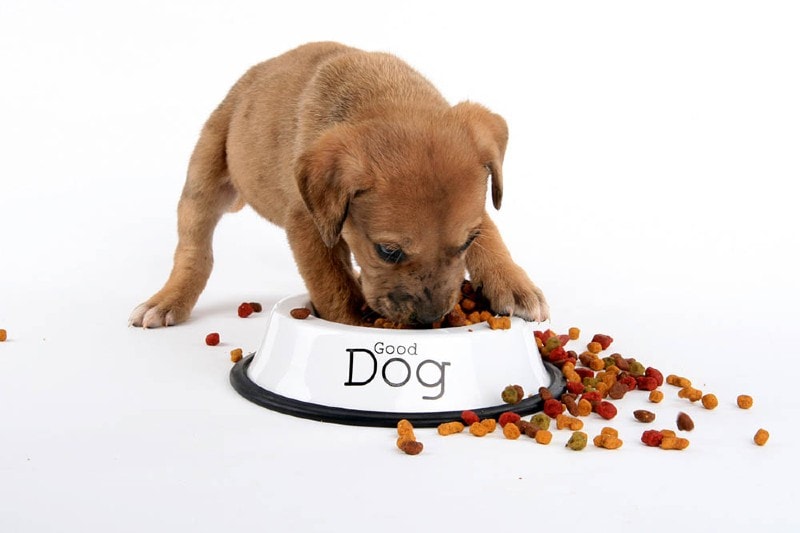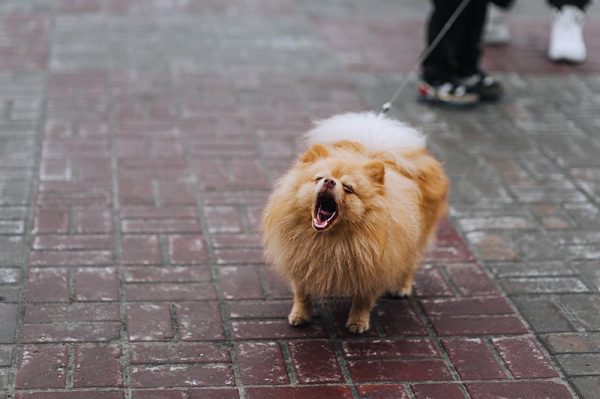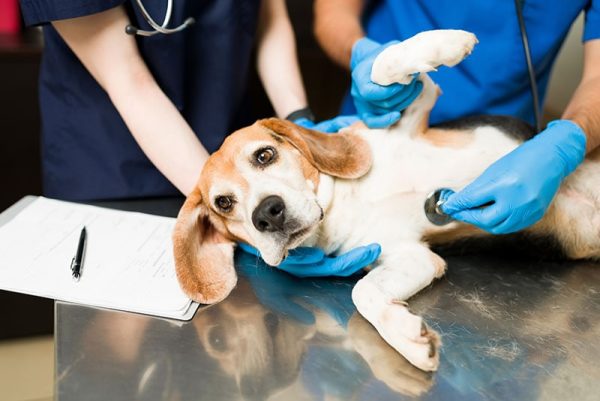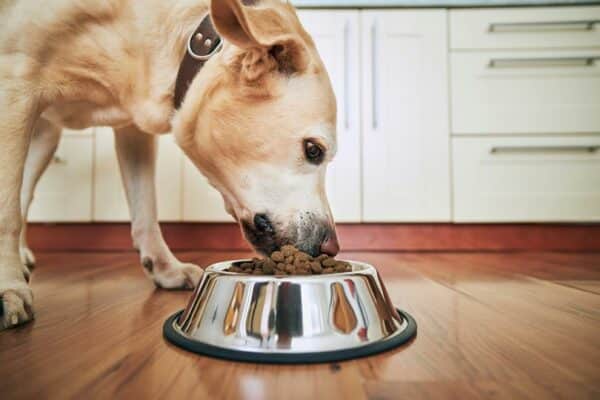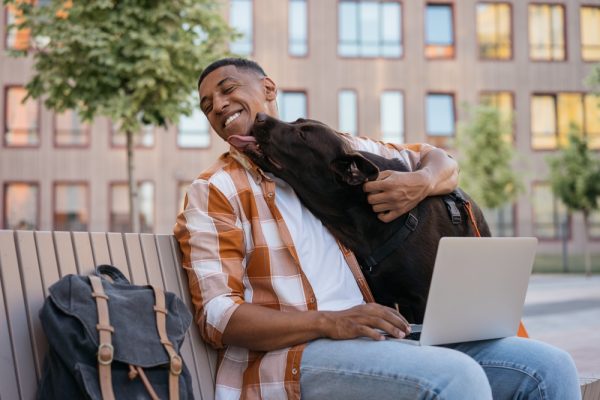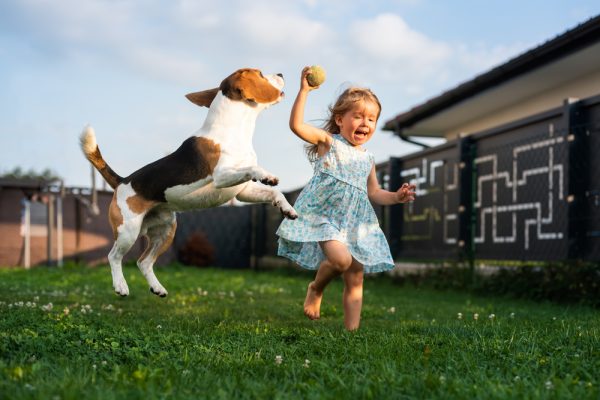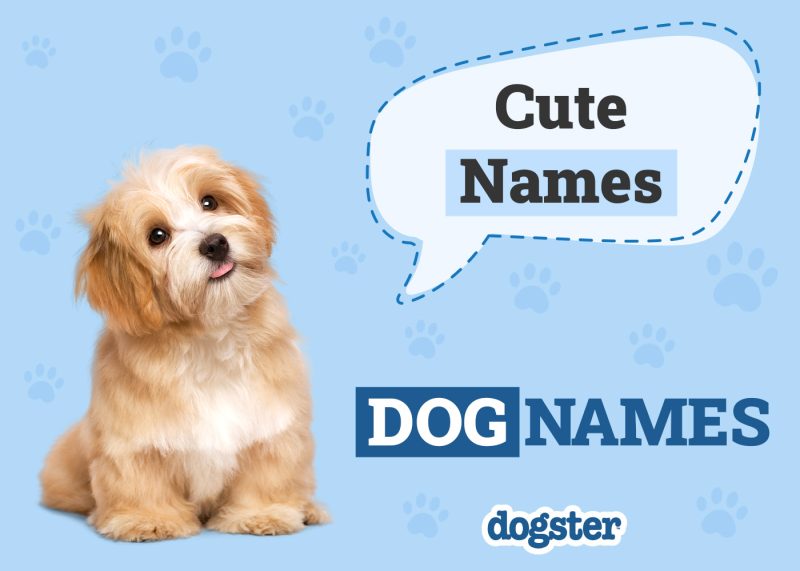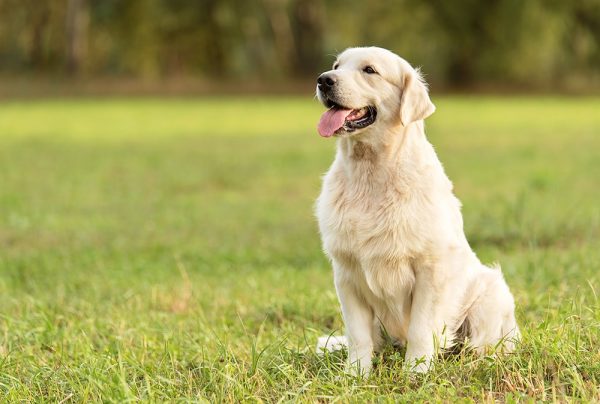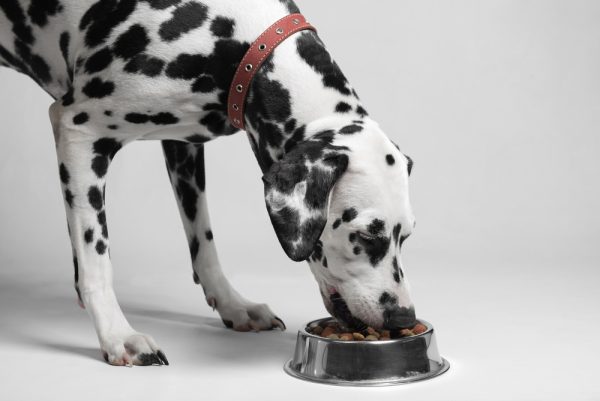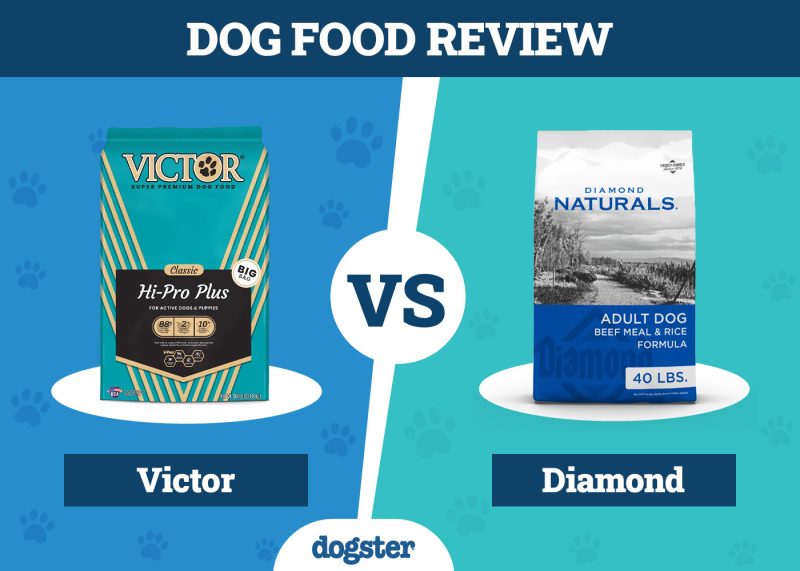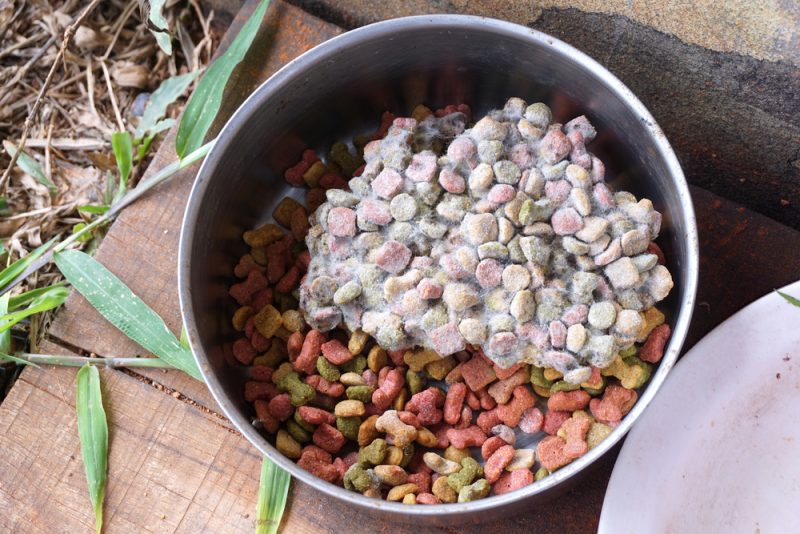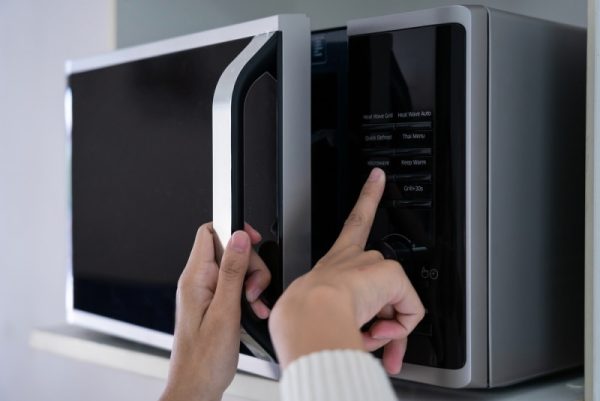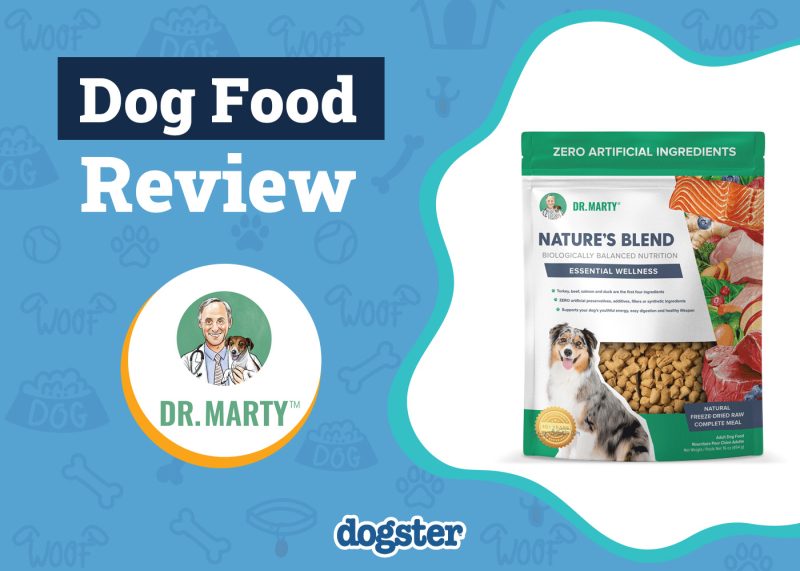Bringing a new puppy into your home is always exciting, but along with the good can sometimes come some bad. Your puppy may exhibit some behaviors that you need to train them out of, like chewing on absolutely everything or eating too fast. Eating too quickly, especially, is a behavior you want to break, as it can lead to health issues, like regurgitation, and, although the evidence is not yet conclusive, bloat.
But why does your puppy eat so fast in the first place? There are a handful of common reasons why our tiny canine pal exhibits this behavior, ranging from excitement to underlying health issues. If you want to know why your puppy is eating so quickly at mealtimes, why it can be dangerous, and how you can train them out of doing it, keep reading!

The 5 Common Reasons Your Puppy Eats Too Quickly
1. Pure Excitement
Dogs get excited over everything, especially puppies! So, your puppy may be gobbling down their food just because they’re so excited to have it. This is the likely culprit if none of the other reasons listed below seem to fit why your dog is eating so fast.
You’ll simply need to teach your puppy to eat slower, but there are ways to do that, which we’ll talk about later on!
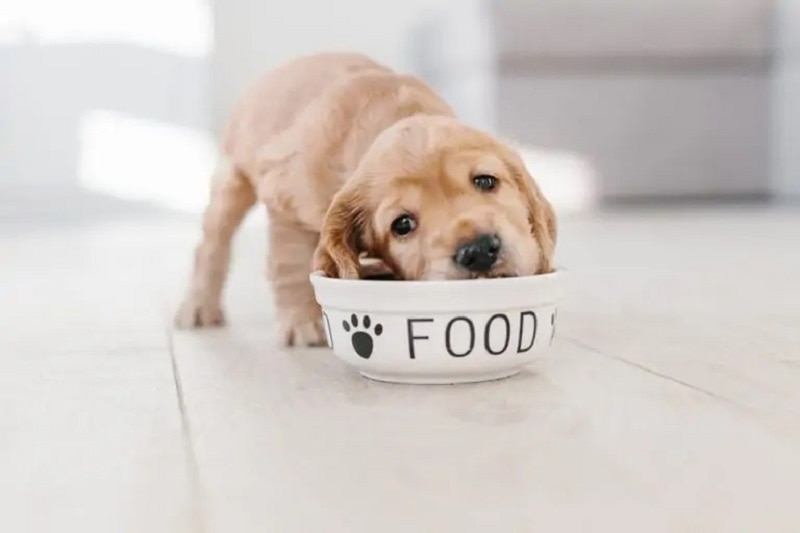
2. Food Insecurity
Did your dog come from a shelter where there were a lot of animals and not enough volunteers? Then, it may be that your dog is experiencing food insecurity. If a shelter or rescue is exceptionally busy, the people working there may not be able to feed the animals on a routine schedule. If that’s the case, your dog might have gotten into the habit of eating too quickly because they were unsure when they would receive food again or when food bowls would be removed from their cage.
Dogs that have previously been stray may also gobble down their food when it comes for similar reasons; they don’t know when their next meal is going to come and they don’t want to risk not eating it all while it’s there.
Hopefully, your dog will soon realize that the food at your home isn’t going anywhere (and you can help by feeding your puppy at the same time each day) and slow down on their own.
3. Competition
Is your puppy just one of many dogs in your home? Then your pet may be eating too quickly because it views mealtimes as a competition; for example, your pup believes they need to eat the food before another dog comes along to take it. This habit of competing for food can result from growing up in a large litter where your puppy and their siblings fight for food.
Even if you don’t have other dogs in your home, your pup might be viewing you, children in the home, or even cats as competition! You can ease the anxiety of needing to compete for food by allowing each animal in your home to eat out of a separate bowl (or having them eat in separate rooms if needed).
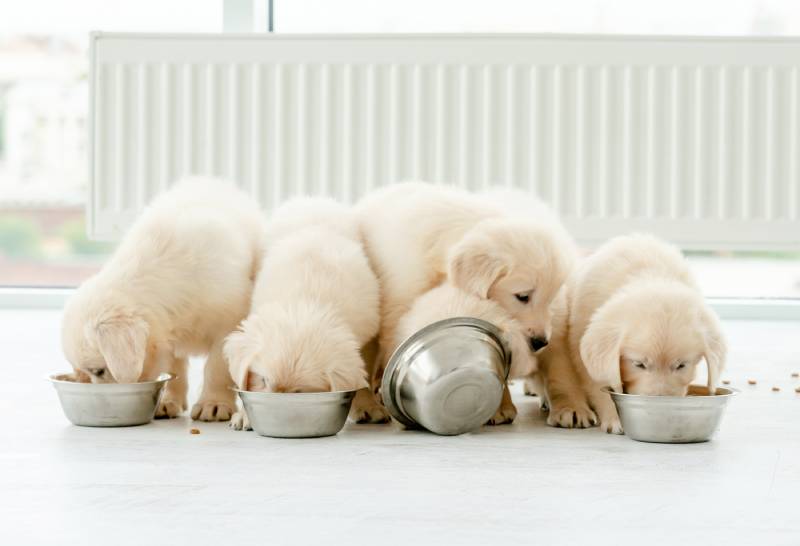
4. Parasites or Illness
Parasites or other health problems could also be causing your pet to feel extremely hungry all the time. Therefore, the need for speed when it comes to mealtimes is out of desperation for food. If your puppy has roundworms (a type of parasitic intestinal worm), it could cause them to become ravenous and begin eating faster, as they aren’t getting the same nutrition they were before.
Or it could be that your pet has an illness like Cushing’s disease or diabetes (although these are much more a consideration in older pets) that affects metabolism and hunger. If you don’t think any of the other reasons on this list are the cause of your pup’s super-speedy eating, then take them to the vet for a check-up!
5. Inappropriate diet or quantity of diet
As in the case of parasites such as worms, a poor quality or unbalanced diet can also result in your puppy gobbling their food due to malnourishment. It may be that your puppy is more active than most, so the recommended amount of food isn’t enough for them to make up all the energy they burn off.
Or your pup might need a different dog food, such as one that is breed-specific, to meet their nutritional needs. If you believe this could be the issue, speak with a vet for recommendations on how to ensure your pet is getting all the nutrition they need.
If you need to speak with a vet but can't get to one, head over to PangoVet. It's our online service where you can talk to a vet online and get the advice you need for your pet — all at an affordable price!


Why Eating Too Fast Is Dangerous for Your Puppy
Why does it matter if your dog eats too fast? It may seem like a fairly innocuous behavior, but your dog scarfing down their meals could result in health problems.
The first major issue with eating too quickly is that it poses a choking risk. No matter how tiny your dog’s pieces of kibble are, eating them at a fast rate can result in choking. An increased rate of eating may also lead your dog to regurgitate or gag (which isn’t fun for your puppy or yourself), and it could cause your pup digestive issues like abdominal pain.
Certain breeds, such as those with flat faces e.g. French Bulldogs and Pugs are very prone to getting aspiration pneumonia (food debris entering the lung space and causing pneumonia) due to their Brachycephalic Airway Syndrome (BOAS) which makes breathing difficult and sometimes labored. So for these breeds, eating their food too quickly has the additional increased risk of aspiration pneumonia. Encouraging slow and steady eating can reduce the chance of this.
The other major and life-threatening problem with your puppy eating faster than they should is that this behavior may put them at increased risk for bloat or a twisted stomach as some know it. The technical term for this is gastric dilatation and volvulus and this is a very serious condition indeed. The jury is still out on whether speed of eating can be a direct cause of gastric dilatation with some research suggesting it is and others suggesting it isn’t.
However, most studies agree that aerophagia (swallowing air) is linked to bloat in dogs, and eating too quickly does cause aerophagia. Bloat is a severe condition that can be fatal, so if you find your dog experiencing symptoms (trying to vomit with nothing coming up, abdominal swelling, lethargy, collapse), you should get them to the vet as soon as possible!
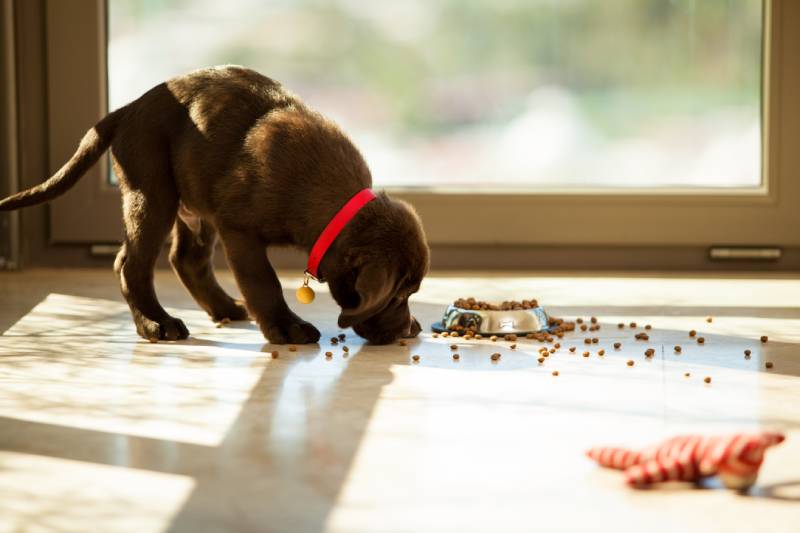

How Can I Get My Dog to Eat Slower?
You can get your puppy to slow down at mealtimes in a few ways. Pick one and try it out, or combine options. Just remember to have patience! Fast eating can be a learned habit, so your pup will need time to unlearn it.
1. Slow Feeders or Puzzle Toys
One of the simplest ways to get your fast eater to slow down during mealtimes is by using a slow-feeder or puzzle toy. Slow-feeder bowls are just like regular dog bowls, except for the fact they contain obstacles, like ridges or walls, that your puppy will need to go around to get at their food. Puzzle toys work similarly, except they come in different forms than a bowl.
Some puzzle toys will make your dog work at getting the toy to dispense food, while others (like snuffle mats) give your pup the opportunity to sniff out their meal.
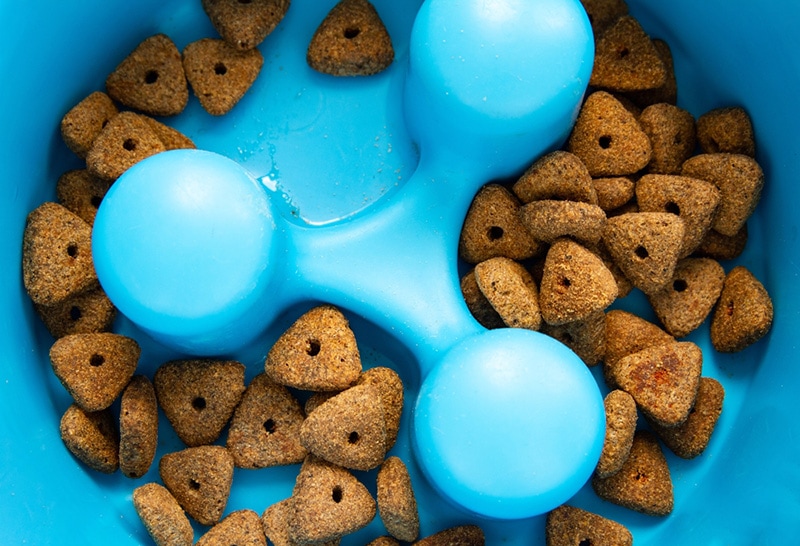
2. Several Meals a Day
If you’ve been feeding your puppy one to two large meals a day, you may want to try breaking those meals down into several smaller ones throughout the day. This may not necessarily slow your pup down, but eating smaller amounts of food at a time should help reduce the risk of digestive upset and more serious complications.
3. Keep Puppy Separate
As mentioned previously, if you feel as if your puppy is eating too quickly because they’re trying to compete for food with other animals or people in the home, feeding them separately might help. With no competition during mealtimes, your pup will hopefully slow down during chow time.
Choose a different area from where you feed the rest of your household, such as another room, and see if this helps your pet. You may still need to combine this with something like a slow-feeder.
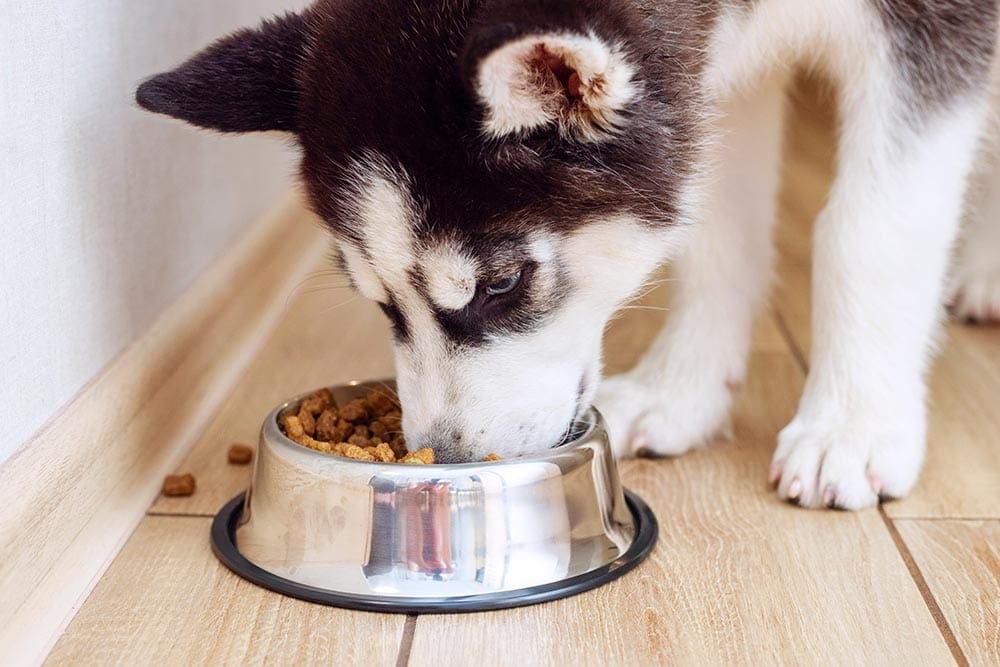
4. Hand-Feeding
This way of helping your puppy eat slower is admittedly time-consuming, but if you have the time available, hand-feeding your pup can help slow them down tremendously when it comes to eating.
Plus, hand-feeding your dog doubles as training them to eat slower (so you won’t need to hand-feed them forever!) and gives you the opportunity to bond. It’s a win-win!

Conclusion
Your puppy can eat too fast at meals for several reasons, including food insecurity, excitement, and a belief that they must compete for food. Gobbling down their kibble can be dangerous to your little one, though, so it’s a habit you’ll need to train them out of sooner rather than later.
Luckily, you can do that with the help of slow-feeder bowls, puzzle toys, or even hand-feeding your pup. It just may take a little bit of time to get your dog to slow down at mealtimes!
Featured Image Credit: Rick’s Photography, Shutterstock
